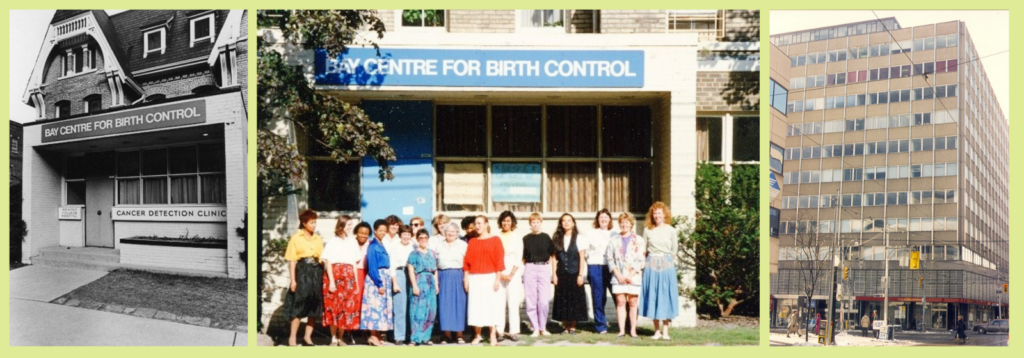By Sam Pender

Reproductive healthcare in Canada has come a long way in the last several decades, and Women’s College Hospital’s (WCH) Bay Centre has long been at the forefront of providing access to that care. After the legalization of contraception in Canada in 1969, WCH began to establish its Family Planning Program, which would eventually become the Bay Centre for Birth Control, opening on March 19, 1973. Fifty years later, Bay Centre continues to be a leader in providing access to reproductive care.
“Bay Centre has evolved so much over time because we’ve had to adapt to the world around us and our services have adapted to meet the needs of our population,” says Sarah McCarthy, Registered Nurse, Bay Centre. “When you look at where it started and where we are today, it’s been an incredible fifty years.”
In its first year of opening, Bay Centre was not only Toronto’s first hospital-supported walk-in birth control clinic, but it also established itself as a teaching clinic for nursing, medical, social work and pharmacy students. Today, the Centre continues to provide reproductive education to healthcare workers from Canada and overseas, increasing access to reproductive care beyond the walls of the clinic and even the borders of the country.
“We have a lot of trainees coming from countries where abortion and contraception is illegal, but medical workers still want and need that training,” McCarthy says. “We’ll have overseas residents come here who have never had access to reproductive health education, and so they’re able to learn those skills to provide that care to their own communities.”
Reproductive care hasn’t always been as widely accepted as it is today, and Bay Centre staff have always been acutely aware of the inherent risks involved in obtaining contraception or abortions, and steps were taken to provide anonymity and to communicate with patients in a safe way.
“As many aspects of reproductive health care were taboo in the early days of Bay Centre, the clinic would use a code name when leaving messages for patients to protect their privacy and, at times, their safety,” says Dr. Rob Dmytryshyn, Physician, Bay Centre.
When it comes to abortion care, Bay Centre has always been at the forefront of increasing access to abortion services, starting in 1988 when Canada’s Supreme Court overturned the country’s abortion ban. Mary Dahonick, a nurse who worked at Bay Centre from 1988 to 2020, recalls being hired after that Supreme Court decision and feeling excited and honoured to be providing this care.
“All of the staff and volunteers were passionate and dedicated to providing excellent women-focused care,” recalls Dahonick. “We moved locations twice after opening at 901 Bay Street, but whether we were at street level in the little house, on the eighth floor of an office building or in Women’s College itself, people found their way to us as the need for safe abortions, access to birth control and sexual health issues do not go away.”
Dahonick remembers waiting rooms “packed to the rafters” with women and teens from all walks of life. “Some in their kilts from a local Catholic high school, others in their business attire, but they all knew we would be non-judgmental, would listen to their stories and provide the care or contraception they needed.”
Bay Centre has been prioritizing access to reproductive care since it opened, and that still remains one of its guiding principles. From starting a colposcopy program – a diagnostic procedure for detecting cervical cancer – to opening a Manual Vacuum Aspiration program in 1995 to provide necessary care to women who suffered miscarriages or other fetal loss without the need for general anesthetic, all the way to providing virtual, no-touch abortions during the COVID-19 pandemic, Bay Centre has always been a leader in providing access to care and meeting patients where they are.
Over the years, Bay Centre has continued to evolve and adapt to the changing landscape of reproductive care. Back in 1987, an AIDS educator joined the team to provide education on HIV/AIDS to staff and the general public, and in 1995 it was designated as an anonymous HIV testing site by Ontario’s Ministry of Health. In the last several decades, Bay Centre has opened a sexually transmitted infection (STI) testing and treatment clinic, became one of the first large-scale providers of medication abortion and is one of only a few hospitals in Ontario offering surgical abortions up to 24 weeks gestational age, which Bay Centre began providing in 2022.
During the COVID-19 pandemic, the Bay Centre fast tracked the launch of one of Ontario’s first virtual no-touch abortion programs when the pandemic reduced access to reproductive healthcare. Many patients could not attend clinics due to quarantine, stay-at-home orders or the threat of domestic violence.
“By integrating virtual care into our services, the Bay Centre is also able to provide contraceptive counselling and virtual no-touch abortion care for people living in remote areas of Ontario where access to clinics is limited,” says Dr. Dmytryshyn. “This is particularly impactful for patients who would otherwise need to travel long distances to access reproductive healthcare.”
Throughout the years, Bay Centre has remained consistent in their prioritization of easy access to patient-centered reproductive care, and that’s evidenced by not only the long tenures of Bay Centre staff but by the generations of patients who continue to seek care there.
“There are so many people who still come to the Bay Centre for contraception or reproductive care, even if there are closer options for them, because they know someone who had a great experience or they’ve had a previous great experience,” McCarthy says. “When I think of how many patients I’ve had consistently come back in the fifteen years I’ve been here, and the people who bring their kids here, I think that really speaks to the service we provide.”
Congratulations to WCH’s Bay Centre on an incredible fifty years of leading reproductive care in Ontario.